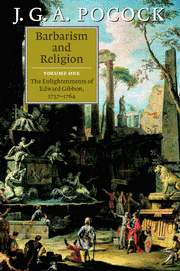Book contents
- Frontmatter
- Contents
- Acknowledgements
- Note on references, quotations and translations
- List of abbreviations
- Introduction
- PART I ENGLAND AND SWITZERLAND, 1737–1763
- PART II THE ENCOUNTER WITH PARIS AND THE DEFENCE OF ERUDITION, 1761–1763
- 6 The politics of scholarship in French and English Enlightenment
- 7 Erudition and Enlightenment in the Académie des Inscriptions
- 8 D'Alembert's Discours préliminaire: the philosophe perception of history
- 9 The Essai sur l'étude de la litterature: imagination, irony and history
- 10 Paris and the gens de lettres: experience and recollection
- PART III LAUSANNE AND ROME: THE JOURNEY TOWARDS A SUBJECT, 1763–1764
- Epilogue: Gibbon and the rhythm that was different
- List of references
- Index
10 - Paris and the gens de lettres: experience and recollection
Published online by Cambridge University Press: 15 December 2009
- Frontmatter
- Contents
- Acknowledgements
- Note on references, quotations and translations
- List of abbreviations
- Introduction
- PART I ENGLAND AND SWITZERLAND, 1737–1763
- PART II THE ENCOUNTER WITH PARIS AND THE DEFENCE OF ERUDITION, 1761–1763
- 6 The politics of scholarship in French and English Enlightenment
- 7 Erudition and Enlightenment in the Académie des Inscriptions
- 8 D'Alembert's Discours préliminaire: the philosophe perception of history
- 9 The Essai sur l'étude de la litterature: imagination, irony and history
- 10 Paris and the gens de lettres: experience and recollection
- PART III LAUSANNE AND ROME: THE JOURNEY TOWARDS A SUBJECT, 1763–1764
- Epilogue: Gibbon and the rhythm that was different
- List of references
- Index
Summary
Gibbon's journey through various Enlightenments – English and Swiss, now French, with the Scottish yet to come – was associated in every case but the last with the possibility of a self-identification, a decision to settle in a certain country or city, and with a moment in the process of selecting the historical study and writing in which he was going to engage. In the Memoirs he wrote of his conviction that he had been in pursuit of this search since childhood, and in the militia journal he had recorded a search for the subject of a history. His philosophical defence of erudition has preoccupied us for several chapters, and we have now to return to his visit to Paris in the early months of 1763, undertaken as soon as his militia service could be ended and before the peace treaty that made it possible was finally signed. There is eagerness here to encounter one of the central cultures of Enlightened Europe, while at the same time his critique of d'Alembert had engaged him in debate with its most recent (and very powerful) intellectual enterprise. The written evidence, contemporary and subsequent to his visit, tells of a continuing concern with his identity as a man or rather a gentleman of letters, and the experience ends with a decisive turn towards erudition which had some surprising results. The narrative, including that written a quarter of a century later, requires and may reward close study.
- Type
- Chapter
- Information
- Barbarism and Religion , pp. 240 - 258Publisher: Cambridge University PressPrint publication year: 1999



